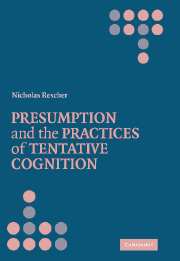Book contents
- Frontmatter
- Contents
- Preface
- Presumption and the Practices of Tentative Cognition
- 1 The Legal Roots Of Presumption
- 2 Presumption and Burden of Proof
- 3 Cognitive Presumption and Truth
- 4 Validating Cognitive Presumptions
- 5 Presumption and Inquiry
- 6 Default Reasoning
- 7 Presumption and Trust
- 8 Presumption and Communication
- 9 Presumption in Science and Beyond
- 10 Specificity Prioritization and the Primacy of the Particular
- 11 Dismissing Extremely Remote Possibilities
- Conclusion
- Bibliography
- Index of Names
11 - Dismissing Extremely Remote Possibilities
Published online by Cambridge University Press: 24 July 2009
- Frontmatter
- Contents
- Preface
- Presumption and the Practices of Tentative Cognition
- 1 The Legal Roots Of Presumption
- 2 Presumption and Burden of Proof
- 3 Cognitive Presumption and Truth
- 4 Validating Cognitive Presumptions
- 5 Presumption and Inquiry
- 6 Default Reasoning
- 7 Presumption and Trust
- 8 Presumption and Communication
- 9 Presumption in Science and Beyond
- 10 Specificity Prioritization and the Primacy of the Particular
- 11 Dismissing Extremely Remote Possibilities
- Conclusion
- Bibliography
- Index of Names
Summary
Introduction
Theorists of knowledge have long recognized and emphasized that there are significant differences between theoretical and practical reason, between problem solving in purely theoretical matters (where nothing is at stake save the possibility of mistaken beliefs), and in practical matters (where actual harm of some sort might be incurred). There is, perhaps, no more striking illustration of this situation than the little heeded issue of the treatment of very remote possibilities – those whose probability is extremely small. Here the question before us is this: in regard to matters of practice, should a diminutive probability (one of an effectively infinitesimal magnitude ∈) be seen as being indistinguishable from zero and treated as having no magnitude at all? In deploying probabilities in expected-value comparisons that serve as guides for decision making, could and should we adopt theequation: ∈ = 0? Are we to dismiss those minute probabilities and presume them to be zero? Sometimes the answer is a decided affirmative. And this chapter accordingly addresses one very special case of presumption that answers in relation to our planning for the future, namely, the dismissal of diminutively far-fetched possibilities from our reckoning.
Effectively Zero Probabilities
Probability and cognitive presumption are closely interconnected. The step from probability to presumption is mediated by the consideration that when answers are needed the probability of the available alternatives can help to provide guidance.
Information
- Type
- Chapter
- Information
- Presumption and the Practices of Tentative Cognition , pp. 152 - 165Publisher: Cambridge University PressPrint publication year: 2006
